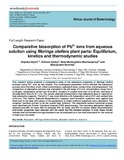Please use this identifier to cite or link to this item:
https://cris.library.msu.ac.zw//handle/11408/3397Full metadata record
| DC Field | Value | Language |
|---|---|---|
| dc.contributor.author | Nyoni, Stephen | - |
| dc.contributor.author | Satiya, Edmore | - |
| dc.contributor.author | Mukaratirwa-Muchanyereyi, Netai | - |
| dc.contributor.author | Shumba, Munyaradzi | - |
| dc.date.accessioned | 2018-12-03T13:57:50Z | - |
| dc.date.available | 2018-12-03T13:57:50Z | - |
| dc.date.issued | 2017 | - |
| dc.identifier.issn | 1684-5315 | - |
| dc.identifier.uri | https://academicjournals.org/journal/AJB/article-abstract/6268C2A66843 | - |
| dc.identifier.uri | http://hdl.handle.net/11408/3397 | - |
| dc.description.abstract | This research article presents a comparative study of the adsorption properties of Moringa oleifera biomass using Pb2+ ions as test analyte. The investigated parameters which affected the adsorption process were the effect of pH, initial concentration, adsorbent dose, contact time, and temperature. The comparison of adsorption process was evaluated in the pH range of 3 to 8, concentration range from 5 to 20 ppm, temperature varied from 25 to 80°C, variation of contact time from 15 to 80 min, and dose of the adsorbent from 0.3 to 1.2 g. The results obtained showed that a high adsorbent dose is required for high adsorption capacity. The pH of 7 was most effective with temperature set at 25°C and contact time of 60 min. The Temkin, Dubunin-Radushkevich, Langmuir and Freundlich isotherms were applied and fitted well to the data and values of the parameters of these isotherm equations were calculated. The Langmuir isotherm proved to be the overall best isotherm. The adsorbent surface functional groups were identified with Fourier Transform Infrared (FTIR) spectroscopy. The maximum adsorption capacity obtained was 98% for seed, 96% for blended, 94% for pods, and 92% for leaves. Better thermodynamic and kinetic properties were obtained with the seeds and the blended samples. In total, these results indicate that the blended moringa biosobent can be employed as a low-cost biosorbent for the removal of lead ions from water. | en_US |
| dc.language.iso | en | en_US |
| dc.publisher | Academic Journals | en_US |
| dc.relation.ispartofseries | African Journal of Biotechnology;Vol. 16, No. 48: p. 2215-2231 | - |
| dc.subject | Biosorption | en_US |
| dc.subject | Moringa oleifera biomass | en_US |
| dc.subject | Adsorption isotherms | en_US |
| dc.title | Comparative biosorption of Pb2+ ions from aqueous solution using Moringa oleifera plant parts: equilibrium, kinetics and thermodynamic studies | en_US |
| dc.type | Article | en_US |
| item.fulltext | With Fulltext | - |
| item.openairecristype | http://purl.org/coar/resource_type/c_18cf | - |
| item.languageiso639-1 | en | - |
| item.grantfulltext | open | - |
| item.openairetype | Article | - |
| item.cerifentitytype | Publications | - |
| Appears in Collections: | Research Papers | |
Files in This Item:
| File | Description | Size | Format | |
|---|---|---|---|---|
| equilibrium.pdf | Full Text | 1.16 MB | Adobe PDF |  View/Open |
Items in MSUIR are protected by copyright, with all rights reserved, unless otherwise indicated.



